
for Sustainability, DEI, and Development Professionals
This workshop is a space to confront these questions head-on. Whether you’re grappling with systemic barriers, feeling disillusioned by greenwashing, or wondering if you’d be more effective outside these systems, this is your opportunity to reflect, connect, and explore alternatives.
Are you questioning the systems you work and live within? Do you feel caught between the desire to create change and the limitations of industries like sustainability, DEI/EDI, or aid?






















Now open for registrations at flexible pricing:
Friday 27th February, 3pm - 6pm UTC (in English)
Sunday 22nd March, 11am - 2pm UTC (in English)
What happens in the workshop?
This isn’t just a discussion.
It’s an interactive experience designed to help you:
Dive into topics like
What’s wrong with “Sustainability, Inc.”?
How greenwashing and systemic barriers perpetuate harm
Whether staying, leaving, or transforming your role is the right path for you
And more

Examine how dominant paradigms in sustainability, DEI, and aid have shaped your thinking and explore ways to “deprogram” from these narratives.

Using Liberating Structures, you’ll collaborate with others to tackle shared challenges and uncover new insights.

Share your experiences and network with professionals navigating similar dilemmas.

This workshop is for anyone working in:
Corporate sustainability
Environmental, social, and governance (ESG) consulting or reporting
Development aid
Academia
Impact investing or sustainable finance
Non-profits or NGOs
If you’ve ever felt isolated, frustrated, or unsure about your role in these systems, this workshop is for you.


We operate on a sliding scale fee model, guided by the principles of radical relationality. This approach invites participants to reflect on their position within systems of privilege and exploitation and contribute accordingly.
Minimum fee: EUR 25
Suggested maximum fee: EUR 500
If the minimum fee is a barrier, please contact us.
We’ll ensure you can participate.
Why this model?
Radical relationality asks us to:
Acknowledge our relationships to systems of extraction and exploitation
Reflect on how economic, political, and social structures shape our access to resources
Move capital in ways that repair, reverse and regenerate harm
You may also choose to be informed by the World Inequality Database's Income Comparator.
Once you've had a chance to reflect, specify an amount that feels right for you to pay.
Payment is made at the end of the registration form, within which the minimum fee of EUR 25 is paid. Additional payments are possible after the workshop via links provided.
Spaces are limited.
Secure your spot today!
Use the prompts below to determine your contribution:






Conducted in English via Zoom (with closed captioning).
Participants can join by video or phone, with options to remain off-camera and use chat for interaction.
To maintain confidentiality, no recordings or transcripts will be provided.
We will use breakout rooms for small-group discussions and peer-coaching rounds. Two 10min breaks are scheduled throughout the 3h session.
This is facilitated as a safe space to voice concerns and support one another.

What did participants enjoy most about the workshop?
"Discovered new perspectives through workshop content"
"Critically assessing and reflecting on my role in the sustainability industry and the expectations I held previously and today"
"Open and trustful exchange with other professionals sharing our experiences"
"Leaving with a sense of community, connection and broader understanding and enriched outlooks"

What insights, confusion or clarity did participants gain from the session?
"Motivation to share my experiences more, to reflect on the finer things in life and to recognise and remember that I am not alone"
"Seeing feasible approaches to do things differently in my role, pursuing change via re-evaluating my own mental construction of my role"
"Discovering that we all have some ego in defending in our own work as sustainability professionals, and maybe care too much about what others think"
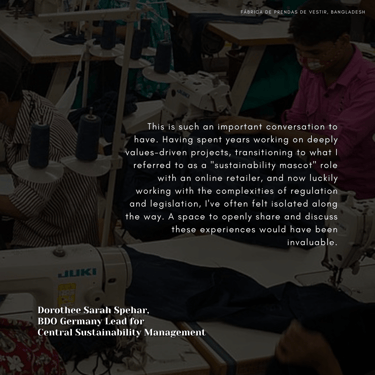
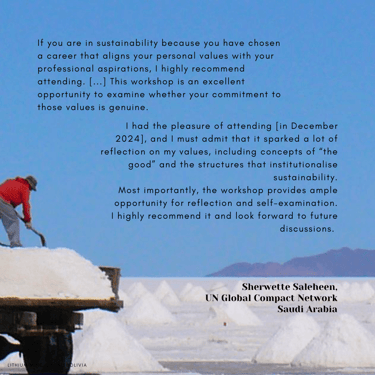
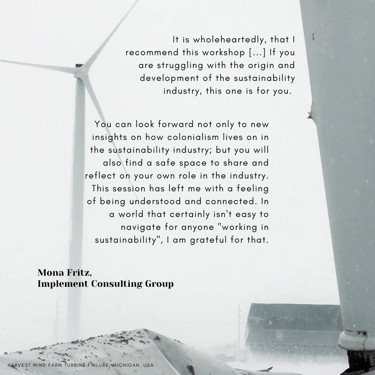
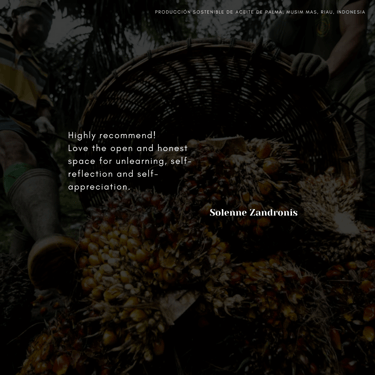
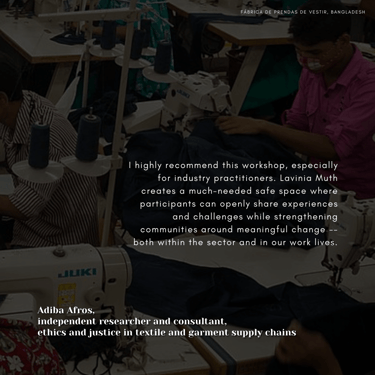
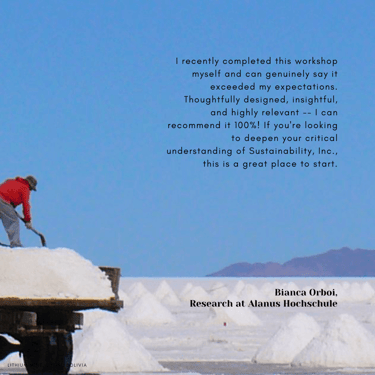
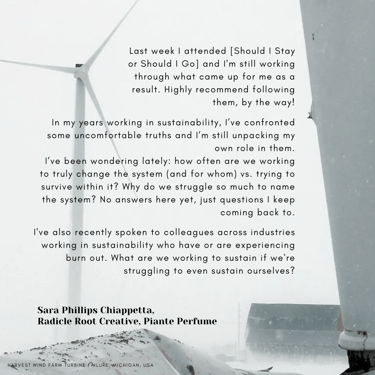
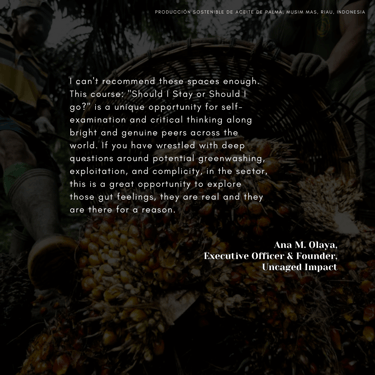


brings 15 years of experience in sustainability, fashion, and agriculture. Having transitioned from compliance and auditing roles, Lavinia has witnessed the pitfalls of traditional sustainability narratives and “stewardship superiority.”
Through her participation in the POSSIBLE FUTURES course Intro to Decolonial Sustainability, she has deepened her understanding of social and environmental justice and now focuses on questioning power...

Vidhya is an interdependent, intersectional, and interdisciplinary evaluation practitioner, scholar, organiser, and activist. She has spent the last 20 years sustaining her family and a larger community by selling her intellectual labour—research/evaluation services and knowledge products—to organisations and governments within the nonprofit/ nongovernmental industrial complex. She started her own practice by necessity, upon being fired at the height of COVID and in the midst of the 2020 uprisings because her last employer objected to her public discussion of the dissertation research that they had actively recruited her for two years before. In response to countless experiences like this, she founded The May 13 Group, which is a still-emerging ecosystem among those of us seeking to repair the harm caused by this kind of exploitation of racially otherized evaluators through a cooperative, solidarity economy.
She has a Master's degree in Public Affairs, concentrating in Nonprofit Management, which she supplemented with a self-designed secondary concentration in Race, Class & Gender in Global Perspective. An artist first, she brings her training in Fine Arts and Art History with her everywhere.
You can reach her at vidhya@whyisevaluationsowhite.info or read/ watch/ listen to her work in/on/through/around research & evaluation on LinkTree.


Q: Where does my payment go?
A: 12% goes to POSSIBLE FUTURES Collective Fund; 37% goes to indigenous rights organisations in West Papua; 51% goes to the facilitation team
Q: What languages and formats will the workshop take place in?
A: The workshops will take place in English, in multiple time zones, at multiple times of day and days of the week by video conference using the Zoom platform's meeting format, whose accessibility features are listed here. If Zoom is new to you, we suggest downloading the platform and practising to use it in advance. In our Zoom sessions, participants will be muted when they are not speaking, will not be required to be on video, and can hide self-view if desired. We will refrain from using flashing or strobing animations. We will enable closed captioning. Due to the sensitive nature of the topic, a transcript of the session will not be available afterwards (nor will the session be recorded). During each session, we will share our screen for a short amount of time to present a slide deck.
Please indicate on the registration form if you would like the content of the slides translated into a language other than English.
The meeting format allows for interaction by chat. Participants may also call in. Facilitators will describe and read the content of the slides and periodically summarise the chat for those who may be joining by phone, visually impaired, or otherwise hindered from engaging with the chat function during the call.
The facilitators also aim to speak clearly and enunciate. Pauses are included to allow time for people to think before sharing and 10-minute comfort breaks are provided around each 60-minute mark.
This workshop involves English-language peer coaching. We are happy to offer German or Spanish sessions should there be sufficient interest (min. 10 pax). Please indicate your interest below.
Q: Do I need to prepare anything ahead of time?
A: If not already using Zoom, download Zoom and familiarise yourself with its features.
Read facilitator bios and explore their work.
Registration closes 12h prior to the start of each session.
If you would like to join but experience difficulty covering the minimum workshop fee of EUR 25, contact us via this form.









